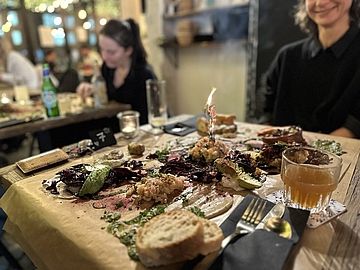Sustainability as an element of DNA and image
Companies no longer see sustainable action as merely an option, but as an essential part of their self-image. This trend analysis examines the diverse opportunities for sustainable action.
Drivers of sustainability:
- Legal regulations: Legal regulations play a central role as a driver for sustainable action. Companies have to adapt to ensure compliance. At the same time, the personal motivation and attitude of entrepreneurs contribute to the implementation of sustainable practices.
- Searching for USPs and differentiation: The search for unique selling propositions (USPs) and differentiation from competitors can provide a lot of motivation for sustainable action. Sustainable measures can strengthen a company’s position in the market and generate competitive advantages.
- Digitalisation with AI, plant-based nutrition, fair trade and packaging solutions: Sustainability is closely linked to various topics, including digitalisation with artificial intelligence (AI), plant-based nutrition, fair trade and new packaging solutions.
Sustainability in the context of diverse topics
Sustainability should not be viewed in isolation, as it is linked to various topics, particularly:
Plantarianism: Plant-based nutrition and a more conscientious attitude towards animals are trending. Companies are integrating these aspects into their ranges in order to offer what their consumers are looking for.
Digitalisation with AI: Tools and apps are increasingly being used to make topics such as enterprise resource planning, management of food waste and recipes, and personnel planning more sustainable. The user-friendliness and intuitive operation of these applications are very important elements that are constantly being improved.
Social impact: Companies can create real social added value through measurable sustainability activities. Examples such as the Too Good To Go app and the start-upAbillion have shown how social responsibility can be integrated. Abillion is in second place in the global ranking of social impact start-ups. As an online marketplace, the app includes a map showing vegan and sustainable restaurants, among other features.
Fair trade: The popularity of Fairtrade products is increasing and entire towns are qualifying as Fairtrade towns. That label is awarded by Fairtrade International only once certain criteria have been met.There are now more than 200 ‘Fairtrade towns’ in Germany, offering opportunities for the restaurant and catering sector and industry to get involved.
Sustainable packaging: For sustainable packaging solutions to be widely accepted and achieve market penetration, it is essential that they are simple, accessible and available everywhere. New reusable solutions are also in demand, such as the reusable oil bottles from Dotch GmbH. They are filled in Germany, with oil produced within the country.
Regionality and seasonality are king
Regional dishes are often preferred to organic food. The combination of regionality and seasonality, ideally paired with authenticity in their implementation, is the pinnacle of sustainability. Clear communication and storytelling are particularly important when it comes to this emotive topic.
Reduction of CO2 from international raw materials
Raw materials that are traditionally international but now grown locally make a contribution to reducing CO2. Examples such as melons from Lower Saxony or chia and quinoa from Bavaria rather than faraway lands demonstrate how shorter transport routes can make an important contribution to sustainability.
Recycling and upcycling
Recycling and upcycling are growing in significance. Creative approaches such as the processing of apple pomace into apple leather, which can be used to make sustainable trainers distributed by the cooperation partner VLACE, for example, or the use of leftovers from kombucha production to make wood, show how resources can be cleverly reused.
Challenges and criticism
1. The ‘Green Star’ – the MICHELIN award for sustainability
The MICHELIN Green Star award, which was introduced in 2020 in response to the growing importance of sustainability in the restaurant industry, has received a lot of attention and praise.Of the 16,000 restaurants currently recommended by the MICHELIN Guide, just over 400 have been honoured with the MICHELIN Green Star.
However, the lack of transparency in the judging process has been criticised. In addition, critics warn of the very real danger of greenwashing.
2. The challenge of high costs
Given the current high, in some cases rocketing, costs, especially in the areas of energy and raw materials, as well as the return to 19% VAT on food in restaurants in Germany, achieving sustainability targets is a major challenge. It requires a high level of cost efficiency at a time when fair prices for meals are as important as ever for guests.
Sustainability case studies
Friðheimar in Iceland: A restaurant in the middle of a tomato greenhouse that uses tomatoes from the region for everything from bread and soups to cocktails.
Heaven’s Kitchen in Stuttgart: The winner of the 2023 German Gastro Start-Up Award is a zero-waste restaurant concept with compostable paper used instead of tableware and the option of takeaway compost for guests.
Planet A Foods: A start-up that produces a sustainable, cocoa-free chocolate alternative (ChoViva) using regional ingredients such as oats and sunflower seeds.
Significance and lessons for the foodservice and hospitality market
Sustainability has become a fundamental element in the DNA and image of companies, and one that combines many disciplines, including digitalisation with AI, plant-based nutrition, fair trade and new packaging solutions.
The challenge: the rise in raw material prices and various crises are influencing the behaviour of guests, which can lead to decreased interest in sustainable offers. Nevertheless, it is important not to neglect the topic.
Regionality in combination with seasonality is crucial and requires clear communication and storytelling to get guests on board.
Honesty and sincerity are key to building trust. The aim is to create lighthouse projects that suit the relevant concept and play a significant role in society. Greenwashing must be avoided at all costs, as guests are highly attuned to sustainability matters.
Summary
The integration of sustainability into the foodservice and hospitality market is not only a business necessity, but also an opportunity for differentiation and to gain a competitive advantage. Companies that successfully embrace sustainable practices can not only fulfil legal requirements, but also exceed the expectations of their guests and set themselves apart from the competition.
The various drivers, including legal regulations, personal motivation, the search for USPs and adaptation to current developments, make it clear that sustainability is not just a trend, but is firmly established as part of the DNA at the core of a business. It is linked to a variety of topics and there are therefore a multitude of ways in which companies can improve their sustainability performance.
The case studies presented show that sustainable action is not only environmentally and socially responsible, but can also be creative and innovative. Companies that take on this challenge are not only contributing to environmental protection, but are also actively shaping their own future in the foodservice and hospitality market.
Karin Tischer and INTERNORGA FoodZoom
Karin Tischer, the internationally recognised food trend researcher and founder of the food & more research and development institute in Kaarst, compiles the annual INTERNORGA FoodZoom trend analysis for the foodservice and hospitality market on behalf of INTERNORGA. It provides an exciting summary of the food and beverage trends that are shaping the industry. food & more has been developing concepts, innovations and recipes for industry, the foodservice and hospitality market (from large-scale systems to start-ups), B2B providers and retailers for 27 years and is involved in trend research worldwide.
Karin Tischer’s Pink Cube has been the trend forum at INTERNORGA for 11 years and will be presented on the Open Stage for the first time in 2024.



